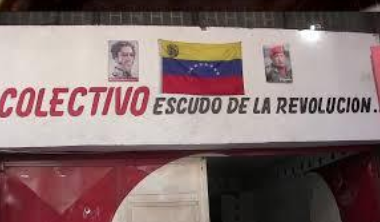Operations base of Shield of the Revolution collective
[Correction: A colleague pointed out that our previous version incorrectly defined colectivos as “armed, pro-government groups.” Not all colectivos are armed. Furthermore they present themselves as defenders of the revolution more than the government.]
On Friday, October 24 Venezuelan President Nicolas Maduro announced he would be giving General Miguel Rodríguez Torres a “two week rest” from his post as Minister of Interior, Peace and Justice (MIJ). “Then I will appoint him to a new strategic mission I have for him,” declared Maduro.
The new MIJ is Defense Minister Admiral Carmen Meléndez. Her first move was to sack the entire administrative leadership of the investigative police body CICPC.
The moves came after high profile tensions and clashes between the CICPC and armed colectivos. Colectivos are pro-Bolivarian, community groups, many of which are armed.
Members of several important colectivos had demanded the dismissal of Rodríguez Torres because of an October 7 CICPC operation in downtown Caracas that ended with the deaths of five colectivo members. Among the dead was José Odremán, the leader of the “Fifth of March” network of colectivos who had come to the scene of the battle in solidarity with the “Shield of the Revolution” colectivo that was being acted against by the CICPC. Shortly before being killed, he declared that Rodríguez Torres should be held responsible for anything that might happen to him.
The remaining members of Odremán’s Fifth of March network had announced a rally to take place on Thursday the 23rd at the Attorney General’s office to demand an investigation into the deaths. But the event was called off that same day without explanation. This naturally led to suggestions that the colectivos had made a deal with the government involving the removal of Rodríguez Torres.
We may never know what happened behind the scenes. But it should not surprise that there is conflict between security forces that think of themselves as the legitimate holders of the state’s monopoly on violence and groups of armed citizens who see themselves as legitimate defenders of the revolution. Further complicating matters, these claims to the legitimate use of force coexist within a context of weak institutions and political turmoil.
On the one hand, there has been long-term tension between the CICPC and irregular groups over the issue of gun control. In January 2014 a several day confrontation in a dormitory suburb of Caracas had issues of gun control as its backdrop. Indeed Juancho Montoya, a colectivo leader who was killed during the February 13, 2014 protest, apparently by a rival, generated controversy by having signed on to the government’s efforts to disarm colectivos.
In the days after the October 7 confrontation reports suggested that the CICPC acted against Shield of the Revolution because of their involvement in the killing of a police officer. Crime reporter Javier Mayorca suggests that the operation was interpreted by some as the beginning of a renewed effort to disarm the colectivos.
After the Minister’s removal, analyst Carlos Raul Hernández declared that “Rodríguez Torres became a symbol of the desire to subject the so-called colectivos to the authority of public security bodies; this is a struggle Rodríguez Torres has just lost. The colectivos have imposed themselves over the state’s monopoly on force.”
On the other hand, Venezuela’s security forces have a long history of illegitimate use of force in the form of extrajudicial executions. This has led some to suggest that the colectivos have more democratic credentials than the CICPC. Odreman’s family members suggest that his colectivo had information on corruption and irregularities in the El Paraiso CICPC precinct (listen to interview with his sister from 10:50).
Indeed the October 7 deaths recalled this history and brought Chavista journalist and politician Jose Vicente Rangel to refer to it as “Operation Massacre”. He called on the government to take measures to not repeat the errors of the previous regime.
Criticism of the CICPC is not exclusive to the pro-government left. Human rights group PROVEA, which has sparred with the government in recent years but has as one of its original and still central cases the massacre at Cantaura, asked the Attorney General’s office to investigate Rodríguez Torres and the head of the CICPC, over the deaths on October 7.



